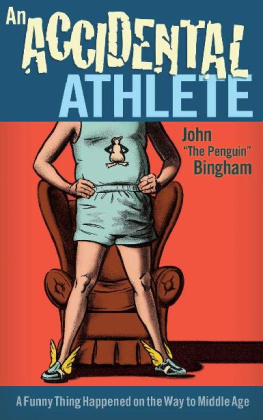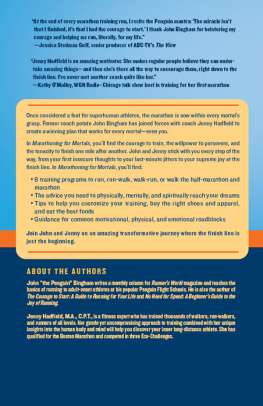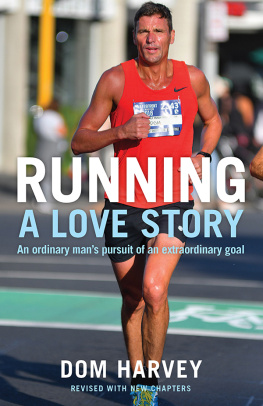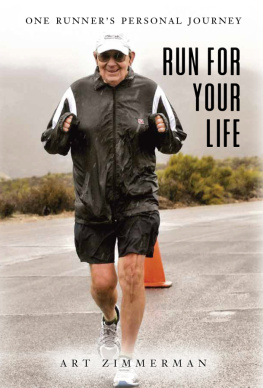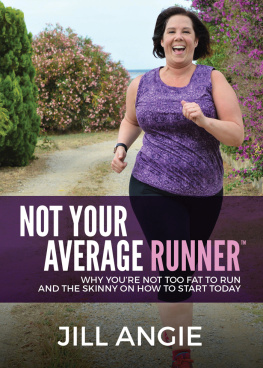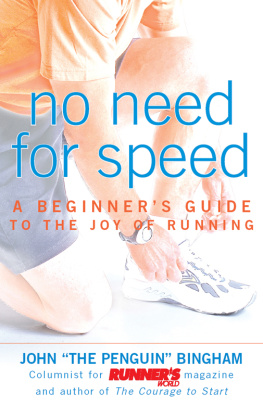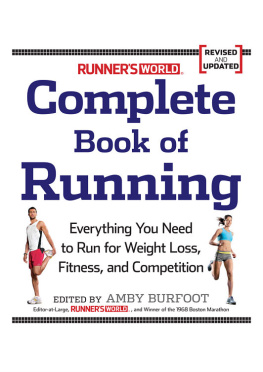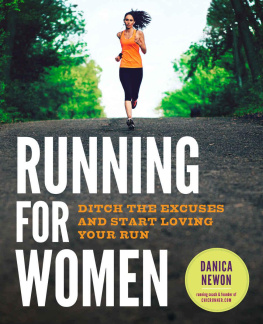To Mart,
for all the miles
you never got to run
ACKNOWLEDGMENTS
I like to read acknowledgments. Ill read the acknowledgments even if I have no intention of buying the book. I may not find out much about the book, but I find out a lot about the author: whether they think they got to where they are by themselves (I dont), and whether they recognize how truly fortunate they are that they got to put their thoughts and feelings into print (I do).
My entire life has been an apprenticeship for this moment, and to thank all those who have taught me, gently or harshly, would look like a biography. There are those who believed in this project long before I did and others who withheld their support to protect themselves in case it failed. I am grateful to the believers for helping me start and to the doubters for giving me the incentive to finish, if only to prove them wrong.
It all begins with family, and there I have been lucky. The struggle to find oneself is made easier if you have the light of love. Many of those who have been the brightest lights are not here to read the words, but my life stands as testimony to their caring. To those who are here, to my mom and dad and my brother, I send my gratitude.
I want to thank my son, Terry, especially, for showing me in himself the best of everything I ever hoped for in myself. If it is true that the child is father to the man, then he is surely the finest teacher I have ever had.
There are more recent mentors and friends, who, although they have seen only the most current me, are nonetheless important contributors to who I am becoming. There is Marlene Cimons, who saw something in my words, and Nicole Brodeur, who first put the process of me becoming myself into writing. Thank you.
I want to thank Amby Burfoot, executive editor of Runners World magazine, for having the courage to publish the first Penguin Chronicle, and Mark Will-Weber, whose editing of those columns made them better than I had ever dreamed they could be.
Thanks also to Sue Flaster, who sat through hundreds of pancake breakfasts listening to me panic, and Linda Roghaar, who dragged me around New York City like a wet puppy.
And, of course, my thanks go out to the thousands of runners who have allowed me to look inside their lives. In particular, I want to thank the most wonderfully strange group of people who are members of the Penguin Brigade. This extended virtual family proves to me that there will always be a reason to believe in tomorrow.
Finally, I would like to thank my wife and running partner, Karen, for the countless hours she has invested in this book and for the years she has invested in me. With every step we run, we discover each other and ourselves.
Without her, none of this would have been possible. And, more to the point, without her, becoming myself wouldnt have been worth the struggle.
INTRODUCTION
A s a child I loved to run. Looking back, I think I ran almost all of the time. I loved the feeling of moving from where I was to where I wanted to be. When there was no reason to run, I ran anyway. I liked games in which you had to run. I ran when I should have, and I ran when I shouldnt have. I ran into things, and over things, and around things.
Then, one day when I was nine or ten years old, I found out that I wasnt any good at running. I was shocked. It wasnt that I was just a little slower than other kids. I really wasnt any good at all. My legs went in all the wrong directions, my arms flailed, my feet flipped and flopped. I stank.
What made me so sure? Easy. Everyone told me so. Friends told me. Teachers told me. Coaches told me. And I told myself. I found out that almost everyone I knew was faster than me. From that moment on, I wasnt running, I was chasing.
Chasing isnt nearly as much fun as running. Being last, always last, stopped being fun almost immediately. Despite the joy that I had experienced in running as a child, by the middle of my elementary school years I was convinced I would never be an athlete.
Participating in team sports only added to my childhood pain and frustration. I was always last there, too. Have you ever been the last one picked to be on a team? Have you ever had the humiliating experience of watching as everyone but you is chosen? I did. Often. I was picked to be on the team as an afterthought. Not so much because I had been chosen, but because there was no one else left to choose.
So I stopped running for nearly forty years. Though nothing was as satisfying as running, I found other activities that interested me. It would be kind to call those activities hobbies. They werent. They were places to hide. They were substitutes for the activity I missed the most. Running. Like many other people, I fooled myself into thinking that if I was successful at my job or had bigger houses and faster cars, I would forget the pain of being picked last. I didnt forget. You probably havent either.
So, as an adult, I missed the joy of moving my body. I spent nearly all of my leisure time watching other athletes do what I thought I could not do. I watched them run. I watched them play football and baseball and race motorcycles. I dreamed that I was one of them. I was not alone. Every weekend stadiums and living rooms are filled with people like me, people who believe that living the life of an athlete vicariously is as good as being an athlete yourself. It isnt.
It was a mistake to quit running. I know that now. It was a mistake to give up the joy I felt when I moved my body with nothing more than my own legs, to let others steal my satisfaction from me. It was a mistake I wont make again.
At age forty-three, when I decided to run again, I realized that the images used to describe runners didnt fit me. I wasnt a rabbit. I wasnt a gazelle or a cheetah or any of the other animals that run fast and free. But I wasnt a turtle or a snail either. I wasnt content anymore to move slowly through my life and hide in my shell when I was scared.
I was a round little man with a heavy heart but a hopeful spirit. I didnt really run, or even jog. I waddled. I was a Penguin. That was the image that fit. Emperor-proud, I stand tall to face the elements of my life. Yes, I am round. Yes, I am slow. Yes, I run as though my legs are tied together at the knees. But I am running. And that is all that matters.
As I have told my story, I have discovered that there are Penguins everywhere. They are the runners you see in your neighborhood. They are the runners who race without hope of winning. If you are a fast runner, the Penguins are the ones who are still on the race course when you are driving home.
Rediscovering the simple pleasure of running as an adult is a strange, frustrating, wonderful, confusing, and ultimately immensely satisfying preoccupation. Its hard to erase all the old images of yourself as clumsy and uncoordinated and forget the feeling of isolation you felt when you were always the last one chosen.
But it can be done. You can go from a 240-pound couch potato to a 150-pound marathoner. You can overcome addiction and drug or alcohol abuse. You can overcome a lifetime of failing. It takes a little time for most of us, but thousands of runners who have no more reason to succeed than you do have done it. I did it. They did it. You can, too.
Successful adult-onset athletes are made, not born. To those of us who simply want to run, the value of genetics is highly overrated. Running doesnt require an extraordinary combination of muscle and bone. It requires only the desire to move our bodies and the wisdom to accept the difference between our will and our wont.


